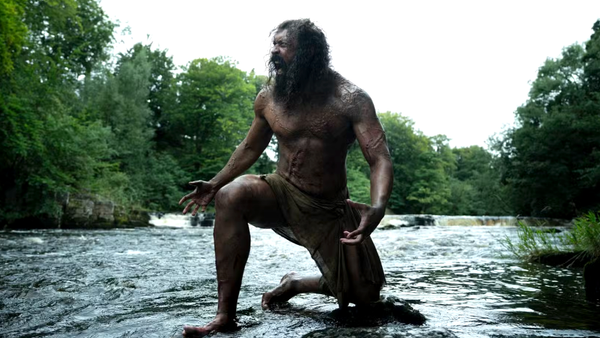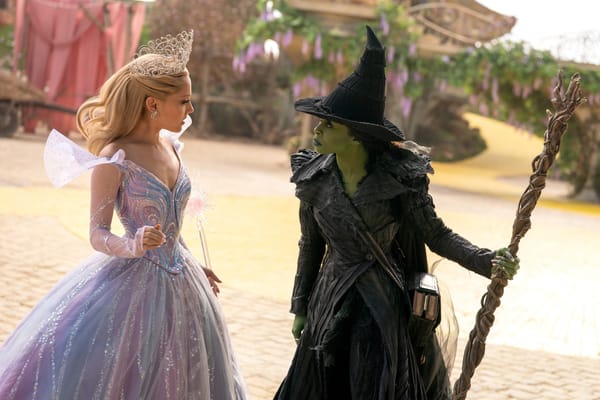Should 'Oppenheimer' Have Shown What Happened When They Dropped the Bomb on Japan?
On whose perspective is valued in our art.

This post won’t contain spoilers for Oppenheimer but it will contain…anti-spoilers? Because I’m going to tell you something that doesn’t happen in Christopher Nolan’s Oppenheimer.
Oppenheimer chronicles J. Robert Oppenheimer’s successful mission to build and test the world’s first atomic bomb at Los Alamos, New Mexico (read my review here). In the film, we see Oppenheimer assemble the greatest scientific minds in the country in the New Mexico desert. We learn about the challenging trade-offs Oppenheimer needed to make between creating an efficient working process and trying to keep state secrets safe. And we watch Oppenheimer struggle with the morality of unleashing something capable of such enormous destruction upon the world.
One thing we don’t see is what happens when the bomb is actually dropped on Hiroshima and Nagasaki. We don’t see any of the death and destruction that’s wrought. At one point in the film, a character watches a slideshow that shows the effect of the bomb on Japanese civilians, but the slides are never seen by the audience. In fact, I don’t think there are any Asian speaking roles at all in the film (I did spot one Asian character in the background during one of the film’s crowd scecnes, but that’s it).
The complete absence of Japanese people and their perspective has been noted in a few major outlets and framed as a negative. For instance, this KQED article is entitled “Who ‘Oppenheimer’ Erases” and features interviews with numerous Japanese Americans whose relatives suffered horribly as a result of Oppenheimer’s creation. A lot of online discourse has centered around a tweet made by Li Lai, the founder of Mediaversity, a website that “grades” films based on their diversity. Li Lai tweeted:
People seem to love #Oppenheimer, but I’ll just say it. I was uncomfy watching yet another movie about tortured white male genius when the victims of the atrocities glossed over by the script — Japanese people, interned Japanese Americans, and Native Americans — had no voice.
The response to Lai’s tweet has been enormously negative, swift, and fierce, with many ridiculing the notion that Nolan needs to included any other perspectives in a film called Oppenheimer (others also called out the fact that Lai ignored the fact that Oppenheimer was Jewish and creating a bomb in a race against the Nazis). In an interview that Christopher Nolan gave to MSNBC (quoted in this piece), Nolan notes why the film adopted this specific approach to tell the story:
Everything is his experience, or my interpretation of his experience. Because as I keep reminding everyone, it’s not a documentary. It is an interpretation. That’s my job.
In The Atlantic, Adam Kotsko (who had not seen the film at the time of writing) claims that “Moralism is Ruining Cultural Criticism” and denounces the practice of grading a film based on which perspectives are included. Kotsko writes about the complaints of Asian representation:
Let’s imagine, though, that those complaints had been anticipated and addressed. Let’s imagine an entire subplot of a family going about their business in Hiroshima. We get to know and like them, to relate to them as our fellow human beings. Then, shockingly, they are incinerated by a nuclear blast. One can already hear the complaints. If the family were portrayed as too morally upstanding, it would be a dehumanizing portrayal that idealizes them as perfect victims. If they had moral flaws, the film would be subtly suggesting that they deserved their fate. And either way, the film would be attacked for offering up their suffering as a spectacle for our enjoyment. The same would go for the displaced population of Los Alamos—by portraying them as passive victims with no agency, critics would surely complain, the film would be reinscribing white authority.
Representation shouldn’t be where the conversation ends
I think everyone here is both right and wrong.
I firmly believe that every story can’t be about everything. Christopher Nolan wanted to tell a story about the making of the atomic bomb from the perspective of Oppenheimer. That perspective required certain trade-offs be made. Even within that perspective, he could’ve shown the devastation of the atomic bomb on Hiroshima and Nagasaki. He chose not to. He deliberately excluded the Japanese perspective, a creative decision that came with numerous trade-offs.
On the one hand, we don’t see the full extent of the horror of Oppenheimer’s creation. On the other, if the film had included archival/re-created footage of Japanese people dying or suffering from horrible radiation burns, it would’ve been accused of profiting or sensationalizing the death of Asian people. Given Nolan’s vision for the film (an important caveat), there was no “correct” approach in how to handle this.
Should we, as a society, declare that every story about this topic must include certain perspectives? Should we have said to Christopher Nolan: “You must make the film in a certain way, or you shouldn’t make it at all?” In my opinion: Absolutely not. Artists should be free to create based on what inspires them. And in general, I’m aligned with Kotsko that movies shouldn’t be evaluated solely based on how many diveristy checkboxes they hit.
We should try our best to take movies on their own terms. Did Nolan succeed in what he set out to do by creating Oppenheimer? In what ways was he successful? In what ways did he fail? In 2014, Matt Zoller Seitz wrote a wonderful piece for RogerEbert.com entitled “Please, critics, write about the filmmaking.” Seitz’s bold recommendation is that people who write about movies should write about, well, the movies:
I refuse to accept the argument that if your writing focuses on, say, issues of politics—race, class, gender, representation in general—then there's no urgent need to comment directly on form.
However.
While we shouldn’t restrain artists from telling the stories they wish to tell, we also shouldn’t refrain from evaluating those works in the context of the world in which they are released.
I found Oppenheimer to be incredibly made in some respects and very clunky in others. But I also found myself asking the question: Who is this for and what is it trying to accomplish? In our Filmcast review of Oppenheimer, my co-host Jeff Cannata struggled with the idea that this movie is in some ways intended to redeem the historical figure of Oppenheimer and I mostly agree. By placing you in Oppenheimer’s perspective, the film encourages you to sympathize with him, to admire his genius, and to agonize along with him as he makes his decisions.
To be clear, since I can already feel the keyboards in the comments/tweets firing up: That is very different from saying the film approves of Oppenheimer or endorses what he did. I think the film takes the perspective that Oppenheimer unleashed unthinkable horror into the world and that Oppenheimer himself struggled to reckon with this fact for the rest of his life. In many ways, I think Oppenheimer’s deeds are unforgivable and I get the sense that Oppenheimer and the filmmaker himself both agree.
That said, for all the art we consume, we should always ask: whose perspective are we being given? Who are we asked to relate to? And what is the net effect of complying? What ideas, structures, and institutions does the film and its perspective support and uphold? And was it important or necessary for it to do so?
For my entire life, I’ve been surrounded by stories about the competence of the American military, the genius of American enterprise, and how history is defined by the words and deeds of a series of great men. If yet another film is released that reinforces all those notions, I think it’s okay to question how valuable such a film is to our culture. And it’s certainly acceptable for someone to express their discomfort with the idea of such a film.
Keeping all of the above in mind allows us to appreciate a film like Oppenheimer, which is a tremendous cinematic experience and tells an important story about the creation of one of the most destructive weapons ever known to humankind. But it also allows us to respond with compassion and understanding when you recommend Oppenheimer to someone and they say, “You know what? I’m good. I don’t need this particular perspective reinforced in my mind nor in modern American society.” Both things can be true. Just because you think a film is great (a fact which is highly debatable in Oppenheimer’s case) doesn’t mean everyone needs to share that opinion or even take it on the same terms as you do.
Thanks for reading Decoding Everything! Consider subscribing to support my work.
Other Stuff David Chen Has Made Recently
- As mentioned, do check out The Filmcast’s review of Oppenheimer, featuring Patrick Willems.
- On Decoding TV, I broke down the disastrous season finale of Secret Invasion with Patrick Klepek. I’m hoping to do a separate write-up of this finale, but we’ll see if I have time this weekend.
- Also on Decoding TV, I’m having a lot of fun talking about Justified: City Primeval with Sarah Marrs. Check it out!
- [PAID ONLY] On my personal Patreon, I host a podcast called Dave on Dave, featuring conversations about life and work between me and David Cho. On the latest episode, I chatted with David about the launch of Elon Musk’s X and my secret to creating so much content each week.



